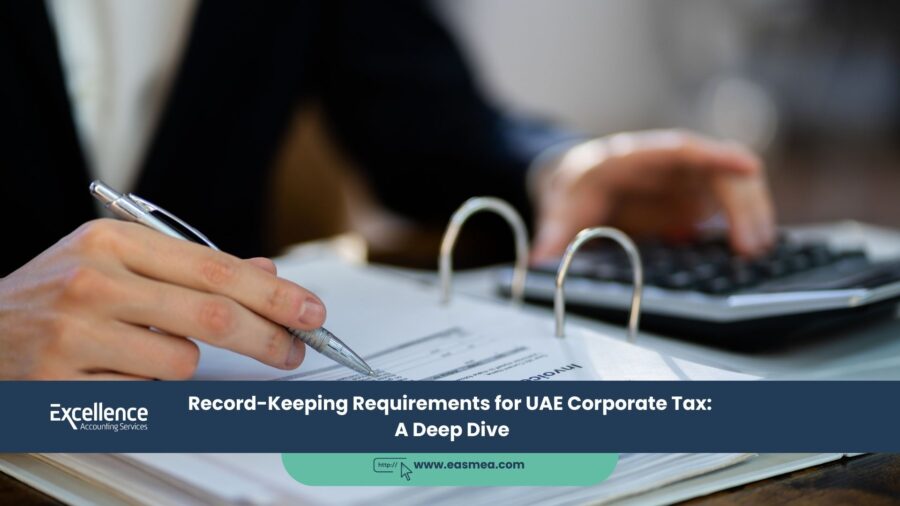Record-Keeping Requirements for UAE Corporate Tax: A Deep Dive
With the implementation of Corporate Tax (CT) in the UAE, the era of informal bookkeeping for many businesses has come to a definitive end. The new tax regime places a strong, legally binding emphasis on maintaining accurate, complete, and verifiable financial records. This is not merely a suggestion; it is a fundamental pillar of the entire tax system. The Federal Tax Authority (FTA) has been clear: your Corporate Tax return must be supported by a robust and accessible trail of documentation.
- Record-Keeping Requirements for UAE Corporate Tax: A Deep Dive
- Why Record-Keeping is the Bedrock of Corporate Tax
- What Records Do You Need to Keep?
- The 7-Year Retention Period
- Building a Compliant Record-Keeping System with Excellence Accounting Services (EAS)
- Frequently Asked Questions (FAQs)
- Is Your Business Audit-Ready?
Failure to comply with these record-keeping requirements is not an option. It can lead to significant administrative penalties, complicate any potential tax audit, and undermine the credibility of your financial statements. For every business in the UAE, from the smallest SME to the largest multinational, understanding and implementing these requirements is a matter of critical importance.
This guide provides a detailed deep dive into the mandatory record-keeping requirements under the UAE Corporate Tax Law. We will outline exactly what documents you need to keep, the required retention period, and the serious consequences of non-compliance.
Key Takeaways
- The 7-Year Rule: All financial records and supporting documents must be kept for a minimum of **seven years** after the end of the relevant tax period.
- Comprehensive Records Required: This goes beyond just financial statements. It includes all underlying documents like invoices, contracts, bank statements, and detailed calculation workings.
- Applies to Everyone: The requirement to keep records applies to **all** taxable persons, including those in Free Zones and small businesses that may be eligible for tax relief.
- Language and Format: Records must be made available to the FTA in Arabic upon request. While they can be kept electronically, they must be secure and easily accessible.
- Penalties for Non-Compliance: The penalty for failing to keep the required records is **AED 10,000 for each failure**, which can increase for repeated violations.
- Foundation of Compliance: These records are the primary evidence used to support the figures in your tax return during an FTA audit. Proper accounting and bookkeeping is no longer optional.
Why Record-Keeping is the Bedrock of Corporate Tax
The entire Corporate Tax system is based on the principle of self-assessment. This means you, the taxpayer, are responsible for calculating and declaring your taxable income. The FTA relies on your records to verify that your self-assessment is accurate. Without proper records, your tax return is simply a collection of unsupported numbers.
Robust record-keeping serves several critical purposes:
- It Substantiates Your Tax Return: Every number on your return, from revenue to deductible expenses, must be traceable back to a source document.
- It Facilitates Audits: If the FTA selects you for a tax audit, providing a complete and organized set of records will make the process smoother, faster, and less stressful.
- It Supports Tax Positions: It provides the evidence needed to support complex tax positions, such as transfer pricing policies or the eligibility for certain exemptions.
- It Enables Good Governance: Beyond tax, good record-keeping is the foundation of sound financial management, enabling better decision-making and business planning.
Your financial records are the official story of your business. In a tax audit, this is the only story the FTA will read.
What Records Do You Need to Keep?
The law requires you to maintain all records and documents that allow the FTA to ascertain your taxable income. This is a broad requirement that includes, but is not limited to, the following:
| Record Category | Specific Examples |
|---|---|
| Core Accounting Records | General Ledger, Trial Balance, Balance Sheet, Profit & Loss Statement, Cash Flow Statement. |
| Underlying Business Documents | Sales Invoices, Purchase Invoices, Contracts, Vouchers, Receipts, Bank Statements (for all business accounts). |
| Asset Records | Fixed Asset Register with details of cost, date of acquisition, and depreciation calculations. |
| Payroll Records | Employee salary details, WPS records, and end-of-service benefit calculations. This is managed through proper payroll services. |
| Tax-Specific Records | All tax returns filed, tax calculations, records of tax payments, and any correspondence with the FTA. |
| Transfer Pricing Documents | (If applicable) Master File, Local File, and any analysis supporting your arm’s length transactions with Related Parties. |
The 7-Year Retention Period
The rule is unambiguous: all required records must be maintained for a minimum of **seven (7) years** following the end of the tax period to which they relate. For example, for the financial year ending 31 December 2024, you must keep all related records until at least 31 December 2031.
This long retention period is necessary to allow the FTA sufficient time to conduct audits and investigations if required. It underscores the importance of having a secure, organized, and long-term storage solution for your financial data, whether physical or digital.
Building a Compliant Record-Keeping System with Excellence Accounting Services (EAS)
Establishing a robust record-keeping system that meets FTA standards requires professional expertise and the right tools. EAS provides comprehensive services to ensure your business is built on a foundation of compliance.
- Professional Accounting and Bookkeeping: We provide outsourced accounting services using modern cloud software like Zoho Books, ensuring your transactions are recorded accurately and all necessary documents are digitally stored and organized.
- Accounting System Implementation: We help you set up and configure your accounting system to meet the specific record-keeping requirements of the UAE Corporate Tax law.
- Tax Advisory and Audit Support: Our tax experts advise on the specific documentation needed to support your tax positions. In the event of an audit, we assist in preparing and presenting your records to the FTA.
- Document Management Strategy: As part of our CFO services, we help you develop a long-term strategy for data retention and management, ensuring you remain compliant with the 7-year rule.
Frequently Asked Questions (FAQs)
Yes. The record-keeping requirements apply to all “Taxable Persons.” This includes any business that is subject to Corporate Tax, regardless of its size or whether it qualifies for Small Business Relief.
No. You can keep your records electronically. However, the electronic records must be secure, unalterable, and easily retrievable. You must be able to produce them in a readable format for the FTA upon request.
You can maintain your day-to-day records in English. However, the FTA has the right to request that any records or documents be translated into Arabic at your own expense. It is a good practice to have key documents like your audited financial statements available in both languages.
You are responsible for the security and integrity of your records. This is why having a robust backup system for electronic records is absolutely critical. A failure to produce records, regardless of the reason, can still lead to penalties.
Yes. A company in a Free Zone is still a Taxable Person. To benefit from the 0% tax rate on “Qualifying Income,” a Qualifying Free Zone Person must be able to prove its status and demonstrate compliance, which requires maintaining audited financial statements and comprehensive records.
If your business has transactions with “Related Parties” (e.g., other companies in the same group), you must maintain specific documentation (a Master File and a Local File) to prove that these transactions were conducted at “arm’s length,” as if they were with an independent third party.
The administrative penalty specified in Cabinet Resolution No. 75 of 2023 is AED 10,000 for the first failure to keep the required records. This increases to AED 20,000 for each subsequent failure.
Yes. The record-keeping requirements for VAT and Corporate Tax are separate but overlapping. You must keep records for VAT purposes for at least 5 years. Since the Corporate Tax requirement is 7 years, complying with the CT rule will generally ensure you also comply with the VAT rule.
Yes. The obligation to maintain records for 7 years continues even if the business is liquidated or ceases to operate.
The first step is to engage a professional accounting firm. They can conduct a review of your current systems, help you clean up historical data, and implement a modern, cloud-based accounting system that will make future compliance much easier.
Conclusion: The Foundation of Compliance
In the new era of taxation in the UAE, robust record-keeping is not a matter of choice but a fundamental legal obligation. It is the foundation upon which your entire tax compliance rests. By investing in proper systems, processes, and professional expertise, you are not just avoiding penalties; you are building a more transparent, efficient, and well-managed business that is prepared for scrutiny and positioned for sustainable success.
Is Your Business Audit-Ready?
Contact Excellence Accounting Services for a professional review of your accounting and record-keeping systems.




